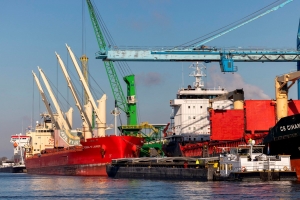


(Posted on 25/10/21)
Over the first nine months of this year, the companies in North Sea Port recorded 51.3 million tons of seaborne cargo transhipment. That is 9% more than in the same period in 2020.
In 2020, North Sea Port faced a 13% fall in seaborne cargo transhipment over the first nine months - in the midst of the pandemic - compared to the previous year. For the first nine months of 2021, it has recorded a significant turnaround, with seaborne cargo transhipment increasing by 9%.
Seaborne transhipment rose by 4.2 million tons (+9%) compared to the first nine months of 2020. Almost 3 million tons (+12%) of this increase is accounted for by dry bulk, with almost all product groups displaying growth (grains, coal, iron ore, cement). North Sea Port is very much a bulk port.
Liquid bulk (such as petroleum and chemical products) amounted to 12.9 million tons, an increase of 6.2%. The volume of ro-ro cargo was 2.6 million tons (+40.3%). Breakbulk declined (-1.2%, to 7 million tons), as did containers (-5.2%, to 1.8 million tons).
Overall, seaborne cargo transhipment in the first nine months was more positive than estimated. If cargo transhipment continues to increase at this rate, North Sea Port will match the record level of 2019 by the end of next year.
Inland navigation transhipment also rose, to 44 million tons (+7.9%). The increase was seen in all cargo types. Only container transhipment showed a decline (-34%).
North Sea Port is a West European port that extends for more than 60 kilometers, 9.100 hectares, and across two countries: Belgium and the Netherlands. Because of its location at the North Sea, the port is directly accessible by sea-going vessels, benefitting global trade.
Its central location in Europe makes North Sea Port a logistics hub through which goods flow smoothly to all corners of Europe and even China. North Sea Port is also part of the Rhine-Alps, North Sea-Mediterranean, and North Sea-Baltic transport corridors, which ensure that goods can be delivered quickly and efficiently by rail, road, and/or inland shipping to their final destination.
With this year’s Rail Conference “Rail Freight Transport and Seaports”, a joint initiative... Read more
Asian Bulk Logistics (ABL Group) and ICG have jointly announced the successful completion of ABL&rsquo... Read more
Abu Dhabi based AD Ports Group, a leading global enabler of integrated trade, industry and logistics... Read more
The Executive Board of Hamburger Hafen und Logistik AG (HHLA) has appointed Patrick Krawutschke as Managing... Read more
Abu Dhabi based AD Ports Group, a global enabler of integrated trade, transport, industry, and logistics... Read more
This year marks a significant milestone in maritime innovation as Port Hedland, Australia, celebrates... Read more
Associated British Ports (ABP), the UK’s leading port operator, has announced the latest tranche... Read more
During the Investment, Labour, and Trade Promotion Programme in Japan (November 16–22, 2025),... Read more
AD Ports Group subsidiary Khalifa Economic Zones Abu Dhabi - KEZAD Group, the largest operator of integrated... Read more
Abu Dhabi based AD Ports Group, a global enabler of integrated trade, transport, industry, and logistics... Read more